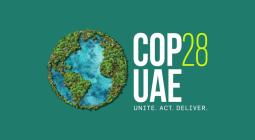The Guardian view on Cop28: energy companies are not the only ones with a carbon addiction

Just like oil and gas businesses, and petro-states, carbon-intensive industries including meat will fight to keep on polluting
Agriculture companies and lobbyists are among those who arrived in the United Arab Emirates for Cop28 determined to resist pressure on them to transform their businesses. Documents show that JBS, the world’s biggest meat company, and allies including the Global Dairy Platform, planned to make arguments in favour of livestock farming with “full force”. While the sincerity of fossil-fuel businesses’ commitment to a green transition has long been doubted, they are not the only energy-intensive businesses to approach Cop28 as an opportunity to promote their activities – rather than a threat.
While the ostensible purpose is to safeguard the planet for the future, the fear is that the Cop process has been captured by the short-term interests of carbon-emitting industries that will do anything to protect their wealth. This year’s gathering is hosted by Sultan Al Jaber, the chief executive of the UAE’s national oil company.
In petro-states such as the UAE, the economic interests of rulers and fossil-fuel businesses are the same. But other rich nations with more mixed economies are also culpable. On Friday Rishi Sunak gave a speech that sought to justify his disgraceful watering-down of green measures on the grounds that they would cost people “thousands of pounds” – with no mention of expected savings. Meanwhile, in the US, fossil fuel extraction is surging, despite the support for renewables in the Inflation Reduction Act.
So far the Cop process has failed to reduce the amount of carbon being pumped into the atmosphere, although the rate of increase has slowed. The remaining carbon budget – the amount that can be emitted while holding on to a 50% chance of staying within the 1.5C limit – stands at 250bn tonnes. One key question for negotiators in Dubai is how that budget is allocated. Another is how the people and ecosystems most harmed by global heating will be helped.
On the latter, there has been some progress with the establishment of a loss and damage fund. But the battle over the continued production of fossil fuels, and the future of carbon-intensive industries such as animal agriculture and aviation, is raging. The first Cop resolution on transforming food systems is a step forward.
Writing in the Guardian, Mr Al Jaber and Kenya’s president, William Ruto, described the need for finance to unlock green industrialisation in the global south as “the existential battle of our generation”. But carbon-intensive industries and petro-states face existential questions of their own. What is their role in the fossil-free future? One answer is that it will not be fossil-free at all. The African forests recently bought as offsets by the UAE-based company Blue Carbon are a licence to keep polluting. Such deals cannot be dismissed out of hand, especially while loss and damage funds are inadequate. African countries need funding for conservation. However, the effectiveness of carbon markets has not been proven. That emissions must be reduced, not redistributed or cancelled out through accounting, is an inexorable fact.
It is the struggle to be allowed to continue emitting in which most, if not all, of those who rely on carbon-intensive activity to generate wealth are engaged. Big oil was never just a handful of corporations – BP, Shell, ExxonMobil, Chevron – as important as those businesses are. The confrontation goes both deeper and wider, taking in industries ranging from shipping and agriculture to construction and cars.






